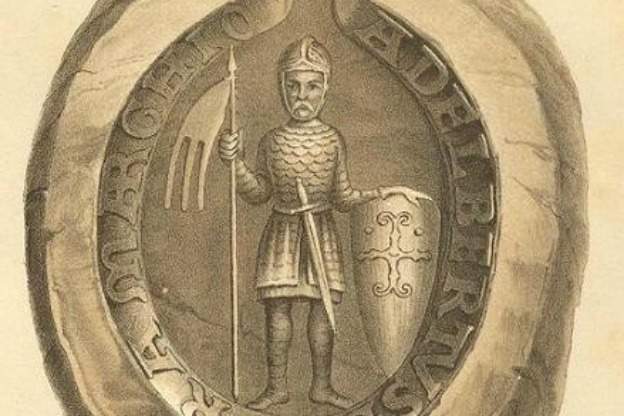
In April, a daughter was born to Baldwin V, Count of Hainault and Margaret I, Countess of Flanders. Isabella of Hainault was betrothed to Henry II of Champagne at the age of one. However, Isabella's uncle later arranged for her to marry Philip, the future king of France. This change in plans angered certain members of Philip's family; and, seizing upon Isabelle's presumed inability to bear Philip a male heir, an attempt was made to have the marriage annulled. In retaliation, Isabelle sought sympathy from the citizens of St. Denis by appearing barefoot and penitent in the city's churches. After re-establishing her marital security, Isabelle bore her son Louis, who ascended the throne in 1223.
In November of 1170, Albrecht I died.
[Note: We apologize for the error in the audio which says he was born in this year.]
Albrecht was the only son of Otto, a wealthy landowner and count of Ballenstedt in central Germany. Following his father's death, and the receipt of his inheritance, Albrecht travelled widely in the service of Lothair III, King of the Germans, and later Emperor of the Romans. Albrecht spent years in battle with Slavic tribes as part of the Wendish Crusade of 1157. His military might earned him praise as, “the shining figure and the great man of the North,” as well as the nickname, “Albrecht the bear.”
In England, in December of 1170, swords fell upon the fleeing figure of Thomas Becket, Archbishop of Canterbury. The notorious assassination is believed by some to have been prompted by years of contention between Henry II and the clergyman. Becket's stance in favor of clerical courts of law, in addition to his excommunication of the bishops of London and Salisbury, caused an enraged Henry to cry, "What sluggards, what cowards have I brought up in my court, who care nothing for their allegiance to their lord! Who will rid me of this meddlesome priest?!” Heeding their king's plea, four knights travelled to Canterbury and violently attacked Becket within the cathedral, while monks were chanting Vespers.
The year 1170 also saw the birth of Minnesinger Walther von der Vogelweide (also known as “Sir Walter of the Bird-Field”). Walther is thought to have been a wealthy and prosperous knight before setting out to wander from court to court. The lyrics of his poetry and songs reflected his lust for adventure and offered either strong approval or harsh critique to those he encountered along the way. Walther sang for the independence and strength of Germany and challenged the supremacy of popes. Upon his death in 1230, Walther was buried at Würzburg in southern Germany. It is believed that he ordered bird seed to be scattered daily at his grave site.









